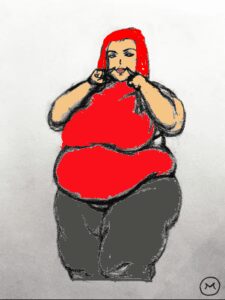At School we were then in the class below the highest one. At home we had advanced in Bengali much further than the subjects taught in the class. We had been through Akshay Datta’s book on Popular Physics, and had also finished the epic of Meghnadvadha. We read our physics without any reference to physical objects and so our knowledge of the subject was correspondingly bookish. In fact the time spent on it had been thoroughly wasted; much more so to my mind than if it had been wasted in doing nothing. The Meghnadvadha, also, was not a thing of joy to us. The tastiest tit-bit may not be relished when thrown at one’s head. To employ an epic to teach language is like using a sword to shave with—sad for the sword, bad for the chin. A poem should be taught from the emotional standpoint; inveigling it into service as grammar-cum-dictionary is not calculated to propitiate the divine Saraswati.
All of a sudden our Normal School career came to an end; and thereby hangs a tale. One of our school teachers wanted to borrow a copy of my grandfather’s life by Mitra from our library. My nephew and classmate Satya managed to screw up courage enough to volunteer to mention this to my father. He came to the conclusion that everyday Bengali would hardly do to approach him with. So he concocted and delivered himself of an archaic phrase with such meticulous precision that my father must have felt our study of the Bengali language had gone a bit too far and was in danger of over-reaching itself. So the next morning, when according to our wont our table had been placed in the south verandah, the blackboard hung up on a nail in the wall, and everything was in readiness for our lessons with Nilkamal Babu, we three were sent for by my father to his room upstairs. “You need not do any more Bengali lessons,” he said. Our minds danced for very joy.
Nilkamal Babu was waiting downstairs, our books were lying open on the table, and the idea of getting us once more to go through the Meghnadvadha doubtless still occupied his mind. But as on one’s death-bed the various routine of daily life seems unreal, so, in a moment, did everything, from the Pandit down to the nail on which the blackboard was hung, become for us as empty as a mirage. Our sole trouble was how to give this news to Nilkamal Babu with due decorum. We did it at last with considerable restraint, while the geometrical figures on the blackboard stared at us in wonder and the blank verse of the Meghnadvadha looked blankly on.
Our Pandit’s parting words were: “At the call of duty I may have been sometimes harsh with you—do not keep that in remembrance. You will learn the value of what I have taught you later on.”
Indeed I have learnt that value. It was because we were taught in our own language that our minds quickened. Learning should as far as possible follow the process of eating. When the taste begins from the first bite, the stomach is awakened to its function before it is loaded, so that its digestive juices get full play. Nothing like this happens, however, when the Bengali boy is taught in English. The first bite bids fair to wrench loose both rows of teeth—like a veritable earthquake in the mouth! And by the time he discovers that the morsel is not of the genus stone, but a digestible bonbon, half his allotted span of life is over. While one is choking and spluttering over the spelling and grammar, the inside remains starved, and when at length the taste is felt, the appetite has vanished. If the whole mind does not work from the beginning its full powers remain undeveloped to the end. While all around was the cry for English teaching, my third brother was brave enough to keep us to our Bengali course. To him in heaven my grateful reverence.







